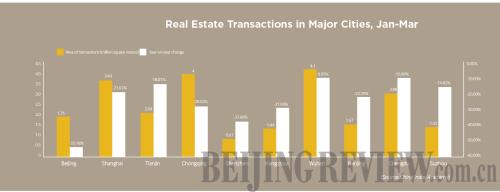|
Yasuhiro Sato, President and CEO of Mizuho Financial Group, suggested China should not tackle the current property issues in an overhasty way to avoid repeating the mistake made by Japan. Austerity measures, like curbing the total amount of real estate financing and elevating interest rates, would probably cause a long-term economic stagnation.
"In regulating and controlling China's real estate market, authorities should try economic measures before resorting to administrative ones and prevent control measures designed for a particular region from impacting the entire market," said Qiu, suggesting that differentiated approaches needed to be implemented in different regions, for signs of polarization had begun to emerge.
In first-tier cities like Beijing, the concentration of population and resources is being constantly reinforced. Since large numbers of migrants and graduates flood into these cities, the housing demand will be still strong. On the other side, in third- and fourth-tier cities, due to sluggish industrial development and large outflow of population, the housing supply has exceeded demand.
"The growth of the real estate market is uneven across the country. In roughly seven to eight cities, housing prices are almost 10 times the average income of local residents, while the bulk of the other 600 cities haven't seen any dynamic at all. Therefore, regulation and control should be oriented to tackle the overheated expansion of a handful of cities," said Qiu.
Beyond that, the government should pick the right time to carry out intervention. As the evolution of real estate market always coincides with urbanization, measures should be taken to rein in its blind expansion when fewer and fewer rural residents migrate to cities and towns, Qiu said.
"However, such an earthquake is unlikely to rock China's real estate market, for urbanization has not yet come to an end. In the following decade, 100 million people will leave farmlands and become urban dwellers, 100 million people will witness the shantytowns in which they live being reclaimed, and another 100 million will settle down in central and western urban regions," said Qiu.
Ensuring social equity
In Beijing and Shanghai, people have got used to judging a person's wealth by the number of apartments he owns. It seems as if people can easily become better off through property investment rather than diligent work.
Since the selection of investment channels is quite limited, Chinese people always presume purchasing homes is the best way to make their money yield a profit, which creates the impetus for growth in the housing market.
To ensure that all citizens can benefit from the ongoing urbanization, an emphasis should be laid on small residential buildings and public properties, which would solve the housing problem for low-income families, Qiu said, noting a total of 7 million units of government subsidized homes would be constructed this year.
"Public properties will allow people who can't afford to buy homes on their own to participate in the development of the real estate market and meanwhile, relieve local governments of heavy financial burdens in solving housing problems for the low-income group," Qiu argued.
Aside from that, taxation is also an option authorities are considering, Qiu said. To restore the dwelling function of housing, property taxes should be put in place to lift the holding cost of speculators. For instance, the first home will be free from taxation while the second home will be levied a consumption tax and the rate will be in direct proportion to the number of homes the person keeps on the books. If the person has his homes unoccupied, a vacancy tax will be slapped on them.
In addition, the long-term viability of affordable housing will significantly facilitate the realization of steady and healthy growth in the housing market, noted Song Lin, President of China Resources Group. The benign interaction between affordable housing and commercial residential housing will help redistribute social resources, because taxes collected from the commercial housing can further fund the construction of affordable housing.
"After going through with all these measures, China's real estate market will regain sustained, rapid and sound development," said Song.
Email us at: dengyaqing@bjreview.com

| 